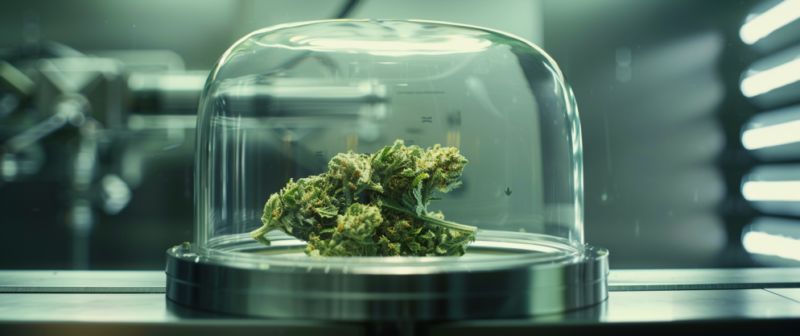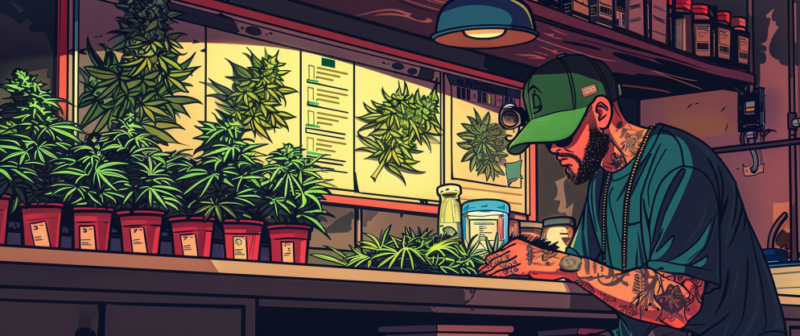Is There Anything Stronger than Delta-8
Curious about the buzz surrounding Delta-8? Is there anything stronger than Delta-8out there?
In this article, we’ll discuss the world of Delta-8 THC, CBD, CBN, and THCv to determine just how potent Delta-8 is. So, is there anything more substantial than Delta-8? Let’s find out together.
What is Delta-8?
Delta-8 is a minor cannabinoid found in the cannabis plant, known to be an isomer of Delta 9 THC, with its unique properties and effects resulting from specific chemical reactions and its formation from tetrahydrocannabinolic acid through heat and other processes.
Is there anything Stronger than Delta-8?
Delta-8-THC is a cannabinoid found in cannabis and hemp plants, but it’s not as potent as delta-9-THC, which is the primary psychoactive compound in cannabis. However, there are other cannabinoids and compounds some consider stronger or have different effects than delta-8-THC. One example is delta-9-THC, which is typically more potent regarding its psychoactive effects.
There are also synthetic cannabinoids that can be much stronger and more potent than natural cannabinoids, like delta-8-THC or delta-9-THC. However, these synthetic compounds often come with significantly higher risks and potential side effects, including a greater risk of overdose or adverse reactions.
It’s essential to approach any substance with caution and awareness of its effects and potential risks, especially in terms of cannabinoids and other psychoactive compounds. If you’re considering using any substance for its effects, it’s wise to research thoroughly and, ideally, consult with a healthcare professional.
-
What is Delta-8 THC?
Delta-8 THC is a chemical compound and one of the many cannabinoids found in the cannabis plant, known for interacting with the cannabinoid receptors in the brain and nervous system.
The molecular structure of Delta-8 THC is similar to Delta 9 THC but with a slight difference in the placement of a double bond, resulting in unique effects. This alteration gives Delta-8 THC a milder psychoactive impact compared to its more potent counterpart. When consumed, Delta-8 THC binds to the CB1 receptors, though with less affinity than Delta 9 THC, leading to a gentler high.
These interactions with the endocannabinoid system influence various physiological processes, including mood, memory, discomfort perception, and appetite regulation. Delta-8 THC is also believed to possess antiemetic, anxiolytic, and neuroprotective properties, making it a versatile compound for potential therapeutic applications.”
-
What is Delta-8 CBD?
Delta-8 CBD refers to CBD products infused with Delta-8 THC. These products are often offered in various forms, such as oils and extracts, with different brands providing a range of options.
These products combine the benefits of CBD with the unique effects of Delta-8 THC, offering users a diverse experience. Brands in the market leverage this fusion by highlighting the enhanced properties, such as potential relaxation and mood-balancing effects. Delta-8 CBD products cater to varying preferences and consumption methods, from gummies and tinctures to vape cartridges and topicals.
Delta-8 CBD products hold a distinctive position in the cannabis market, attracting consumers seeking a different cannabinoid experience.
-
What is Delta-8 CBN?
Delta-8 CBN is a combination of Delta-8 THC and Cannabinol (CBN), both cannabinoids that interact with the central nervous system and are being researched for their potential health benefits.
CBN, known for its soothing properties, is believed to complement the more uplifting effects of Delta-8 THC. When combined, they create a unique synergy that may offer users a balanced experience. CBN is thought to interact with the nervous system by targeting specific cannabinoid receptors, influencing neurotransmitters, and potentially aiding in promoting relaxation and sleep. Understanding how these cannabinoids work together can provide valuable insights into the complex mechanisms of the endocannabinoid system and its impact on overall well-being.
-
What is Delta-8 THCv?
Delta-8 THCv is a variant of tetrahydrocannabinol that is chemically similar to Delta-8 THC, known for its unique effect on appetite and energy levels.
While Delta-8 THC is renowned for its psychoactive properties, THCv, on the other hand, is often referred to as the ‘sports car’ of cannabinoids due to its energizing effects without the typical high.
Delta-8 THCv boasts a shorter and more condensed chemical structure than Delta-8 THC, leading to a faster metabolism and a quicker onset of effects. Both compounds interact with the endocannabinoid system, with THCv potentially promoting weight loss and reducing food intake, whereas Delta-8 THC is more commonly associated with inducing hunger.
How Does Delta-8 Compare to Other Cannabinoids?
Delta-8 offers a unique experience and varying potency compared to other cannabinoids like Delta 9 THC, CBD, CBN, and THCv, each with distinctive effects and applications.
Is Delta-8 Stronger than Delta 9?
While Delta-8 and Delta 9 THC are both forms of tetrahydrocannabinol, Delta 9 is generally considered more potent due to its molecular structure and how it interacts with the brain.
Delta 9 THC has a double bond on the 9th carbon chain, which adds to its psychoactive effects compared to Delta-8 THC, which has a double bond on the 8th carbon chain. This slight variance causes Delta 9 to bind more strongly with the CB1 receptors in the brain, leading to a faster and more intense high.
On the other hand, Delta-8 THC, with its altered molecular structure, is said to offer a milder experience with less psychoactive potency than Delta 9. This difference in binding affinity and structure contributes to varying effects on cognition, mood, and physical sensations when consumed.
How Does Delta-8 Compare to CBD?
Delta-8 THC and CBD vary significantly in their effects on the brain. Delta-8 offers mild psychoactive effects and relaxation, while CBD is known for its non-psychoactive properties.
In terms of relaxation, Delta-8 THC tends to have a more noticeable calming effect on the mind and body due to its psychoactive nature, which can provide a gentle euphoria without the intensity often associated with Delta 9 THC. On the other hand, CBD is celebrated for its ability to promote relaxation without altering one’s state of mind, making it ideal for those seeking relief from stress with a clear head.
How Does Delta-8 Compare to CBN?
Delta-8 and CBN are both cannabinoids with distinct effects; where Delta-8 is often sought for its mild euphoria and relaxation, while CBN is primarily noted for its potential in sleep and discomfort management.
Delta-8 has been praised for its ability to induce a sense of calm without the intense psychoactive effects associated with Delta-9 THC, making it ideal for managing stress. On the other hand, CBN has shown promise in promoting deep, restful sleep by interacting with the body’s endocannabinoid system, potentially offering relief for individuals struggling with insomnia or chronic discomfort.
How Does Delta-8 Compare to THCv?
Delta-8 and THCv differ in their impact on appetite and energy levels. Delta-8 typically increases appetite while THCv may suppress it and boost energy, reflecting their different chemical structures.
Delta-8, a cannabinoid known for its euphoric effects, activates the CB1 receptors in the endocannabinoid system, triggering hunger signals and enhancing food consumption. On the other hand, THCv, with its unique structure, acts as an antagonist to CB1 receptors, potentially reducing appetite and increasing metabolism.
While Delta-8’s molecular arrangement enables it to bind effectively to CB1 receptors, stimulating appetite, THCv’s molecular configuration makes it interact differently with these receptors, leading to contrasting outcomes on hunger and energy levels.
What are the Effects of Delta-8?
Many users have reported feeling a sense of calm and peace after consuming Delta-8 products, making it a popular choice for those seeking stress relief. Besides its anxiolytic properties, Delta-8 has also been associated with increased appetite, which can benefit individuals struggling with appetite suppression due to certain health conditions or therapies. The nausea-reducing effect of Delta-8 is particularly noteworthy, as it can provide relief for those experiencing gastrointestinal distress or undergoing chemotherapy.
What are the Risks of Using Delta-8?
Despite its benefits, Delta-8 carries certain risks, such as potential adverse effects, including paranoia and nausea, and it may also result in a positive drug test.
Paranoia is one of the most commonly reported side effects associated with the use of Delta-8. Individuals may experience intense feelings of unease, fear, or irrational thoughts, which can be distressing.
Nausea is another concern, leading to discomfort or stomach upset that can be disruptive.
Due to its similarity to Delta 9 THC, there is a risk of triggering a positive result on a drug test, potentially causing legal or employment issues for users.
Is Delta-8 Legal?
The legality of Delta-8 is influenced by the Agriculture Improvement Act of 2018 and the Controlled Substances Act, with the Food and Drug Administration playing a significant role in its regulation.
Under the Agriculture Improvement Act of 2018, industrial hemp-derived cannabinoids, including Delta-8 THC, were federally legalized with the condition that they contain less than 0.3% delta-9 THC. The legality of Delta-8 remains a complex issue due to conflicts with the Controlled Substances Act, which classifies Delta 9 THC as a Schedule I substance.
Considering these conflicting laws, the Food and Drug Administration has raised concerns about the marketing and distribution of Delta-8 products, citing potential health risks and the lack of comprehensive testing and regulations. This has led to calls for more precise guidelines and oversight from the FDA to ensure consumer safety and product quality.
Final Thoughts – Is there anything Stronger than Delta-8
While Delta-8 offers a unique and moderate potency experience among cannabinoids, exploring other cannabinoids could reveal more substantial alternatives, depending on the desired effects and individual response.
When considering Delta-8’s potency, it is important to note that it typically provides a milder psychoactive effect compared to its close counterpart, Delta 9 THC. While Delta-8 can offer a more relaxed experience with less intense psychoactive properties, cannabinoids like THC and CBD also deserve attention for their diverse effects.
THC, for instance, is known for its strong psychoactive effects, making it a preferred choice for those seeking a more potent experience. On the other hand, CBD is favored by many users for its non-intoxicating properties and potential therapeutic benefits.
Frequently Asked Questions
Is there anything more substantial than Delta-8?
Yes, some substances are considered more potent than Delta-8, such as delta 9 THC and delta 10 THC, which are both found in higher concentrations in marijuana plants. However, these substances are not legal in all states, unlike delta eight which is federally legal.
Are there any legal alternatives to Delta-8 that are stronger?
Yes, there are legal alternatives to Delta-8 that are considered to be more robust, such as delta 10 THC and THCP (tetrahydrocannabiphorol). However, these substances may have limited availability and are not as well-studied as Delta-8.
Can I build a tolerance to Delta-8 and need something stronger?
Yes, it is possible to build a tolerance to Delta-8 over time, which may result in a decrease in its effects. If this happens, you may want to consider trying a different type of cannabis product or a higher potency of Delta-8 to achieve the desired effects.
Is there a risk of overdose with substances stronger than Delta-8?
Yes, as with any psychoactive substance, there is a risk of overdose if taken in excessive amounts. It is important to always use caution and follow dosage recommendations when consuming any cannabis product, including those that are considered stronger than Delta-8.
What are the potential risks of using substances stronger than Delta-8?
The potential risks of using substances stronger than Delta-8 may include increased psychoactive effects, potential for addiction or dependence, and potential adverse side effects. It is important to research and understand the potential risks before consuming any substance.
Is there a maximum limit for the strength of Delta-8 products?
Currently, there is no official maximum limit for the strength of Delta-8 products. However, it is important to follow dosage recommendations and use caution when consuming higher potency products, as they may have stronger effects and potential risks.


